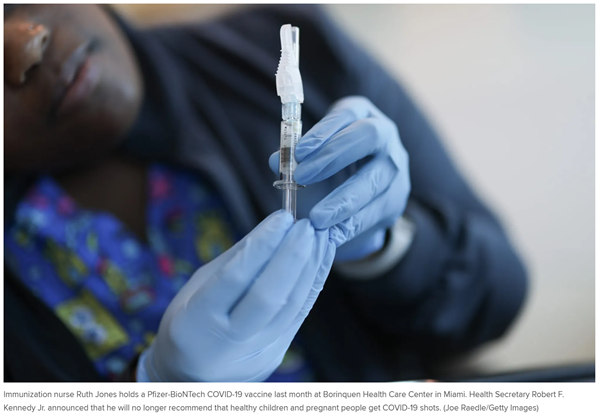COVID Guidelines Just Changed. Black Americans Could Pay the Price
By Angela Dennis
June 9, 2025
 The Trump administration has declared an end to COVID-19 vaccine recommendations for children and pregnant people, and health experts have a warning: This is a threat to Black communities.
The Trump administration has declared an end to COVID-19 vaccine recommendations for children and pregnant people, and health experts have a warning: This is a threat to Black communities.
U.S. Health and Human Services Secretary Robert F. Kennedy Jr., who oversees the Centers for Disease Control and Prevention, announced the decision on May 27 and said vaccine guidance would now focus solely on adults over 65 and those with high-risk conditions, effective immediately. By June 3, Dr. Lakshmi Panagiotakopoulos stepped down from her role helping lead the agency’s COVID-19 vaccine advisory group, saying she could no longer support decisions that put pregnant people and children at risk.
Before the changes took effect, COVID-19 vaccines were recommended for anyone 6 months and older. On Monday, Kennedy forced out every member of the agency’s vaccine advisory committee and announced plans to appoint a new panel. The move comes even as the CDC said children may continue to receive the vaccine “under shared clinical decision-making.”
For Black Americans, the policy shifts are more than bureaucratic changes, according to Oni Blackstock, a physician and founder of Health Justice, a racial and health equity consulting practice.
“These new guidelines don’t exist in a vacuum,” she said. “Limiting booster eligibility risks further compromising the already fragile health status of many Black Americans.”
Black Americans are 1.5 times more likely to contract COVID-19 and four times more likely to be hospitalized, according to the Centers for Medicare & Medicaid Services. Research from the Center for Primary Care at Harvard Medical School found that Black children are more than five times as likely to die from the virus. An estimated 165,000 to 220,000 Black Americans have died from COVID-19, according to data compiled by the APM Research Lab.
According to a 2023 report from the U.S. Census Bureau, nearly 32% of Black Americans who contracted COVID-19 also experienced long COVID symptoms.
The U.S. Food and Drug Administration cited a lack of evidence that annual boosters are needed by healthy, low-risk adults. However, Blackstock, a primary care and HIV physician, said the policy change marks a significant departure from past years when vaccines were broadly recommended and federally funded.
“This contradicts recent CDC data showing that the 2024–2025 boosters benefit people 18 years and older, especially early after vaccination,” she added.
Blackstock noted that many Black Americans already struggle with health care access due to systemic barriers like a lack of insurance and residential segregation.
“When these combine with more restrictive vaccine guidelines,” she said, “it becomes even harder for Black Americans to get boosters and worsens existing health disparities.”
These barriers also deepen historic mistrust in health care, said Jerry Abraham, a family and community medicine physician. Abraham, who is director of the CDU-KEDREN Mobile Street Medicine program in Los Angeles, said the history of medical racism and continued treatment disparities fuel skepticism toward public health. Even as boosters offer real benefits, he said, many remain hesitant or disconnected from resources that ensure protection.
“If children and pregnant women are no longer recommended for vaccination, will grandma still go to CVS and get it herself?” he said.
Abraham added that in an era where health care professionals can no longer trust the updated guidelines from federal agencies, it’s deeply concerning and a reminder that Black communities must once again rely on themselves.
For answers about what comes next, read on.
How does limiting vaccine access to healthy Black Americans increase vulnerability?
Aisha Harris, a family medicine physician in Flint, Michigan, told Capital B that limiting access to COVID-19 vaccines for healthy adults exposes high-risk groups like seniors and those who are immunocompromised.
“Reduced protection in healthy people increases their risk of being infected by COVID and of being a carrier,” said Harris, who owns the direct primary care clinic Harris Family Medicine. “When more people are contagious, with or without symptoms, they have a higher chance of infecting others around them, including in their household or those they are taking care of as caregivers.”
She warned this undermines community immunity. Without widespread coverage, even eligible groups face elevated risks.
Why are these changes being made?
FDA officials say the new approach mirrors those taken by Australia and several European nations that limit vaccines to older or high-risk adults. But some critics argue the shift ignores U.S. disparities and bypasses standard CDC procedures.
Can people who don’t qualify under the new guidelines still get a COVID vaccine?
You can pay out of pocket, but it could cost up to $200. If the CDC doesn’t recommend vaccines, Abraham said health plans are much less likely to cover them, since insurers typically follow CDC guidance.
Haven’t COVID vaccines already undergone clinical trials?
Yes, COVID-19 vaccines have already undergone extensive clinical trials before being authorized for public use.
The FDA says it will require longer…
[READ THE COMPLETE ARTICLE HERE]
